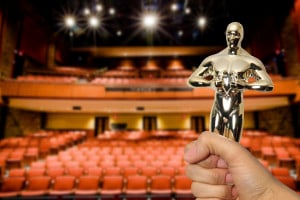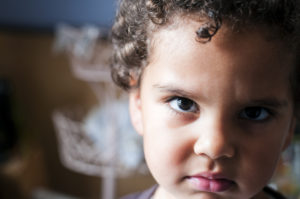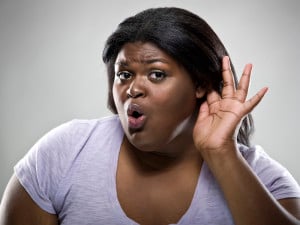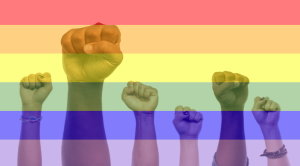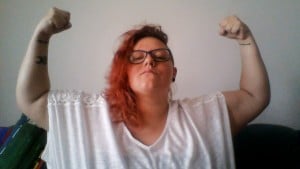Have you ever imagined what you’d say in your Oscars speech?
Whether you’ve ever wanted to be an actor or not, many of us can’t help picturing how it would feel to be recognized for our work on such a huge platform, beaming to the audience and cameras as people around the world applaud our success.
Mine would go something like: “I’d like to thank my parents, my boo, everyone who’s encouraged me to follow my dreams…is it ridiculous to mention my cat? Okay, I’d like to thank my cat – oh! And of course, I must thank the Academy…”
And at that point, I know this daydream is pure fantasy – and not only because I haven’t been cast in any major motion pictures. This scenario is also highly unlikely because I’d be thanking an Academy that has given only six supporting actress awards and one best actress award to Black women – in 87 years.
The 88th Academy Awards won’t change the status quo – all 20 of the acting nominations have gone to white men and women.
Considering that so many of us have practiced our acceptance speeches, it’s pretty clear that the Academy Awards hold a significant place in our culture.
It’s also clear that the Academy is an institution that doesn’t just underrepresent my identity as a Black woman. It consistently over-represents dominant groups like white people.
For instance, in the 20th century, 95% of the acting nominations went to white stars. Since 2000, just 3% of nominations have gone to Latinxs, 1% to Asian actors, and 2% to actors of other backgrounds.
It’s obvious that this is a system of rewarding and normalizing white people in the film industry.
But do you know why the Oscars’ diversity failures really matter?
You probably know, at least, that people are mad about it. In 2015, writer and lawyer April Reign created the #OscarsSoWhite hashtag. It trended again this year after the nominations were announced, with people all over social media decrying the striking lack of diversity.
This has been a problem for so long, and that’s reason enough for disappointment. But the details of this year’s nominations just feel like they’re rubbing salt in the wounds.
For example, some critically acclaimed films directed by and starring actors of color did get a few nominations. For Creed, starring Michael B. Jordan and directed by Ryan Coogler, an acting nomination went to Sylvester Stallone, Jordan’s white co-star. For Straight Outta Compton, white screenwriters Jonathan Herman and Andrea Berloff collected a nomination.
Best Picture and Best Actor were among the six nominations for The Martian and its star Matt Damon. The movie could’ve been an opportunity to give Asian American actors much-needed visibility, but most of the Asian characters in the book were whitewashed for the film adaptation.
Several other missed opportunities could have put a spotlight on people from marginalized groups that are often invisible in Hollywood. The role of Lili Elbe, a transgender woman in The Danish Girl, was played by Eddie Redmayne, a cisgender man who got a nomination for his role. There were no women at all nominated in the Best Director category.
Some people, like Jada Pinkett Smith, are calling for an Oscars boycott. Plenty of other people of color in the entertainment industry are expressing anger about the ongoing problem of Hollywood’s lack of diversity.
But other people have doubts about this response. You might also feel like there’s not actually much to gain from targeting the Academy Awards.
If the ultimate aim is to foster justice, is a glitzy celebrity awards show really the way to go about it?
To you, this year’s Oscars snubs may feel unsurprising, disappointing, but insignificant. Some also think this is a distraction from the “real” racial justice issues we should be focusing on, or worse – that calling for diversity actually achieves the opposite of equality by playing “identity politics.”
So why are people making such a big statement about the Oscars?
Before many of us just settle on the couch with some popcorn and take in the ceremony as a meaningless opportunity to judge people’s outfits and then forget until next year, let’s pause to consider the impact of a moment like this.
Sure, it often feels like pop culture events are trivial. When you apply a social justice lens to Hollywood, you can be accused of “making a big deal out of nothing,” or ruining the fun of pop culture by taking things “too seriously.”
But whenever issues of oppression arise, it matters. And having them arise at one of the biggest entertainment awards shows in the world is no small thing.
So many people will be watching the Oscars, or at the very least, have already heard about the nominations. Even those of you who couldn’t care less about this will likely come across some information about it as you scroll through social media.
Nothing in our culture happens in a vacuum – especially not media events that get the attention of millions of people.
Here are answers to some of the most common questions about why media diversity matters. They’ll show how we have opportunities with events like the Academy Awards to change the institutions reinforcing the oppression we’re all dealing with.
1. ‘Is This Really That Big a Deal? Aren’t There More Important Things to Worry About?’
The number of issues to tackle when it comes to ending oppression is enormous.
So does it matter for people of color to be nominated for acting awards, when we’re losing our lives to racist violence? Does it matter for women to be named Best Director, when we’re trying to fight and heal from the trauma of rape culture?
These are examples of symptoms of oppression, but at the root of all of these problems, there are systems of oppression that need to be eradicated.
People of color struggle against forces like job discrimination and racist violence because of the system of white supremacy. There are a lot of things keeping that system in place – including the influence of the media.
That means it’s not only possible to care about more than one issue related to racial justice – it’s also necessary in order to get to the root of the problem.
For instance, one of the most urgent issues is police brutality traumatizing and killing Black people all over the country. Many people hold implicit biases that lead them to believe in racial stereotypes, whether they mean to or not.
Perceptions of young Black men as “thugs” are a big part of why people call law enforcement on innocent Black boys and men like 18-year-old Jason Goolsby. He was tackled by police after a young white couple thought he looked “suspicious” when he visited an ATM and held the door open for them.
When law enforcement officers answer calls like this, stereotypes of Black men as criminals are also a big part of why they are twenty-one times more likely to kill young Black men than young white men.
And it’s no coincidence that those stereotypes are often the only images we see of Black men in the media.
The influence is clear when someone like 007 novelist Anthony Horowitz says that Idris Elba is “too street” to play James Bond. His perception of a Black man as incapable of portraying anything but a “thug”-like character is not uncommon.
The Academy, whose membership is 94% white, didn’t nominate Elba for his role in Beasts of No Nation, which is being called the most “shocking” of this year’s Oscar snubs.
This is an example of why media diversity matters. Black folks don’t stand a chance of escaping racist violence if the media most people are watching consistently reinforces stereotypes of us as violent thugs.
It doesn’t have to mean that pop culture or the Oscars have to be your thing, and if you do like pop culture, you don’t have to feel guilty or take all the fun out it. As a pop culture fan myself, I’d be the last person to judge you for that.
But you can be aware of the media’s negative influence, so you don’t fall for the stereotypes that get people of color hurt and killed.
2. ‘Then Isn’t It Time to Quit Complaining and Do Something About It?’
Once you recognize the enormously negative influence the media can have, you probably realize it’s going to take more than a hashtag to do something about it.
You may wonder why “keyboard warriors” are even bothering to trend #OscarsSoWhite when they could be out dismantling that pressing white supremacy situation.
Apparently actress Kristen Stewart finds this conversation “boring.” She had an opportunity to speak about #OscarsSoWhite in an interview, and she chose to perpetuate the sentiment: “Instead of sitting around and complaining about that, do something.”
I suppose she thinks she’s being helpful by recognizing that the lack of diversity is a problem, but her statement was pretty dismissive when it comes to the process of challenging a systemic problem.
Making people aware of the issue, how it’s hurting people, and what it takes to change it is one of the most important first steps.
Of course, awareness won’t accomplish everything. But there’s more work happening here, too.
The Academy Awards are presented as showcasing the best of the best in the film industry. We’re making it known that marginalized people and our allies don’t accept their habit of rewarding only the most privileged representation of the best instead.
There is now widespread pressure on media figures in positions of power to respond to the issue – and many of them are, strengthening the call to make the Academy Awards more equal.
Tangible steps are being taken to change the Oscars’ negative influence, and that’s something to be proud of.
If you think marginalized people in the film industry aren’t doing anything but “complaining,” you’re really missing that there are people working hard as hell to overcome these obstacles, and still having doors shut in their faces.
Take Issa Rae – creator of Awkward Black Girl and one of the leaders in an exciting wave of web series that Black writers, actors, and directors are producing all on their own.
Rae developed a show with dynamic characters of color we never get to see on TV. And she was so successful that she got the rare opportunities to develop her show for primetime television.
But TV execs wanted to turn her creation into a whitewashed version just like everything else on television. Resisting that pressure isn’t just about “complaining” – it’s dismantling the obstacles that make it damn near impossible for creators of color to be supported and recognized for their work.
3. ‘Isn’t This Racist Against White People?’
Unfortunately, Kristen Stewart’s not alone in using her platform to spread misconceptions about what media diversity is all about.
Best Actress nominee Charlotte Rampling said the call for diversity is “racist to whites.”
This is a common myth about anti-racism, feminism, and other liberation movements – that by fighting for justice for marginalized groups, we’re being hateful toward white people, men, or other groups in privileged positions.
The Oscars are a perfect example of why this idea is so misguided, and why it hurts marginalized people.
The conversation about diversity at the Academy Awards isn’t about saying white people don’t deserve to be nominated.
But when the vast majority of leading Hollywood roles go to white actors, even in cases of whitewashing characters of color, exceptional actors of color have far fewer opportunities to be in the position to be nominated.
It’s insulting to say that people of color don’t receive accolades simply because they don’t deserve them – especially with so many people of color-led films that could have been nominated this year, like Concussion and Creed.
29-year-old Creed director Ryan Coogler was born in Oakland, California, the setting of his first feature-length film, Fruitvale Station.
With Fruitvale Station, he told the story of another Oakland-born young Black man, Oscar Grant. Grant was shot in the back by a BART police officer early on New Year’s Day in 2009.
For reasons ranging from media misrepresentations to police profiling, it’s difficult for even the most talented people of color to get to where Ryan Coogler is today. But he beat the odds, creating critically-acclaimed major motion pictures.
So expecting the most influential Hollywood awards institution to recognize work like Coogler’s isn’t about giving awards to people just because they’re people of color.
It’s calling for accountability to the Academy’s mission of honoring the best in the industry – not just the best cisgender white men in the industry.
4. ‘Isn’t This What BET Is For?’
The Oscars’ lack of diversity is especially striking when it stands up against other ceremonies that have managed to award plenty of people of color – the SAG Awards, the Sundance Film Festival, and of course, the BET Awards.
Over the years, shows like the Black Entertainment Television Awards have come about to make up for the lack of visibility at mainstream shows like the Oscars.
In other words, the existence of the BET Awards doesn’t invalidate the need for diversity at the Oscars. It exists because Black communities know we deserve to be recognized – and that we’re not going to get that recognition in mainstream media.
Even though the foundation of the BET Awards is the need for Black visibility, these awards don’t only go to Black folks. White entertainers get BET Awards (not to mention, ahem, dominating traditionally Black genres) all the time.
We’re striving for equal representation in the mainstream media because that industry has such a negative impact on our lives.
Mainstream media institutions are also making billions of dollars telling people of color’s stories, and far too often, our contributions are unrecognized, uncompensated, or outright stolen. We need to shift the recognition and credit to the communities that this art and profitability wouldn’t be possible without.
And in the meantime, we also need create the positive visibility we deserve in our own communities, so we don’t have to rely on institutions dominated by white supremacy to recognize us.
5. ‘Then Why Do You Care So Much About White People’s Approval?”
It’s true that marginalized communities have the power to celebrate our own damn selves.
And we should cultivate that power, act on it, and empower each other to build on it, rather than focusing only on getting acceptance from a mainstream institution.
It’s a fantastic vision for creating a new world, and you might think that spending energy on the Oscars would get in the way of that.
Does worrying about recognition from an Academy that’s so overwhelmingly white and male amount to “begging” for privileged people to accept us as marginalized folks?
True, in some ways, it’s possible for this fight to distract us from what liberation really means.
Ultimately, with how deeply systems including racism, sexism, transphobia, ableism, and fatphobia are entrenched in the Oscars, we should hope that such an institution wouldn’t have influence at all.
And I’m sure you’ve picked up by now that fighting oppression requires multiple strategies.
So while the Academy holds the power it does, it’s worth making this statement: As long as these awards reflect the oppressive status quo, they’re failing us.
The image of the Oscars gives us a perception of the stars living lavishly. But there are many, many hard-working actors, directors, writers, and other people in the industry from marginalized communities who are struggling to get by without awards or fair compensation for their work.
This fight is for them, and for all of the rest of us, too. We can break down some of the barriers around us by taking down the media’s support of those barriers.
6. ‘Well, What Am I Supposed to Do About It?’
Changing the Academy’s negative influence could have a pretty big influence.
We could have shifts like more dynamic roles for people of color, instead of ones that reinforce harmful stereotypes. We could have more people who aren’t cisgender men nominated in categories open to all genders, and have audiences appreciate feminine people for more than what they’re wearing. We could have disabled people playing disabled characters, giving much-needed visibility to their communities.
But you might still be wondering what any of this has to do with you. Some people in the industry are boycotting the ceremony, but if your invitation somehow got lost in the mail like mine did, there are still other ways we can contribute to making change.
This is your chance to leverage the power you have as a consumer. Although the mainstream media continues to operate on the belief that the stories of marginalized people aren’t worth telling, we prove time and time again that that’s simply not true.
We tell our own stories, we turn out to watch when people from our communities reach big and small screens, we share how meaningful it is to witness ourselves reflected in the media.
By starting and participating in conversations on media diversity, supporting diverse independent and mainstream media, and expressing your disappointment when ceremonies like the Academy Awards let us down, you can help make the necessary culture change.
The Academy board has already called an emergency meeting in response to this year’s #OscarsSoWhite action, and they announced that they will be making changes with the aim of increasing diversity.
Just think of how else we can help bring positive and much-deserved visibility to our communities by helping build new media expectations.
***
We tend to think of equality as automatically increasing over time, but sadly, the Oscars are an example of how many institutions haven’t changed at all.
For instance, you can probably name some people of color who have received Academy Awards, but I’m guessing they’re around the same handful most of us can name – Denzel Washington, Hallie Berry, and perhaps the first African-American to win an award, Hattie McDaniel.
McDaniel won for her portrayal of Mammy in 1939’s Gone With the Wind. In more than 75 years since then, the few awards given to Black actresses also went to women who played maids, slaves, and other characters that fit common media tropes of Black women.
We’re long overdue for changing the tropes, the invisibility, and the other ways the media’s status quo hurts marginalized people.
For people living with the impact of oppression every day, seeing people from our communities shine, validate our struggles, and affirm our value is vital for survival.
The message of #OscarsSoWhite is a strong reminder of why these changes matter – and how to make sure influential institutions know why they matter, too.
You don’t have to ruin all the fun of pop culture to help change its negative influence. Personally, I’ll be following Oscars commentary on Twitter, enjoying it all with some popcorn while keeping an eye out for chances to shift the conversation to a less oppressive concept of success.
[do_widget id=’text-101′]
Maisha Z. Johnson is the Digital Content Associate and Staff Writer of Everyday Feminism. You can find her writing at the intersections and shamelessly indulging in her obsession with pop culture around the web. Maisha’s past work includes Community United Against Violence (CUAV), the nation’s oldest LGBTQ anti-violence organization, and Fired Up!, a program of California Coalition for Women Prisoners. Through her own project, Inkblot Arts, Maisha taps into the creative arts and digital media to amplify the voices of those often silenced. Like her on Facebook or follow her on Twitter @mzjwords.
Search our 3000+ articles!
Read our articles about:
Our online racial justice training
Used by hundreds of universities, non-profits, and businesses.
Click to learn more


